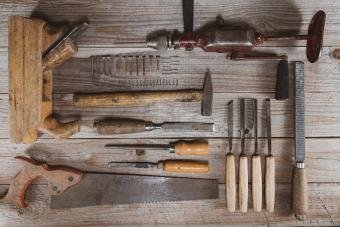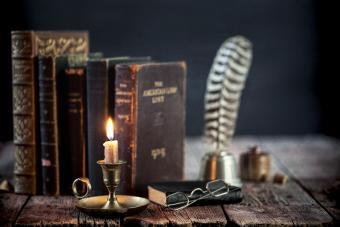
An antique clock price guide should include detailed, specific information to help you identify your clock and try to determine its value. While this might not sound complicated, it certainly can be, but with the right resources, you'll be able to haggle prices with the best clock dealers around.
Online Antique Clock Price Guides
There's an online database of antique clock descriptions and prices. Antique Clocks Identification and Price Guide was developed by two partners, Jeff Savage and Ryan Polite; Savage is a professional antiques appraiser with 33 years of experience in the business and Polite is a skilled IT professional who specializes in database websites.
Their resource teaches you how to identify and date your antique clock from a database of over 21,000 antique clock descriptions, photos and prices. You can also search through their database of over 10,000 clockmakers and watchmakers as well as learn tips on buying and selling antique clocks. Unfortunately, you do have to pay a subscription fee to utilize everything the site has to offer; however, there're many free resources on the site as well.
How to Determine the Value of an Antique Clock

One of the first things you'll notice as you start to research antique clock values is that the same exact model of clock will actually have different amounts of value listed, and this unusual thing happens because the various values are determined based on multiple different purposes.
Different Types of Evaluations
For example, an insurance appraisal for an antique clock might be based on the replacement cost of the clock if it was destroyed in a fire or stolen. This value would be calculated based on the average retail sale price of the clock if it were purchased in good working condition, with guaranteed authenticity, from an antique clock dealer.
If you're trying to price the same antique clock in order to sell it "as is" through a classified ad or through an online retailer like eBay, the clock might only be worth half of what an insurance company would consider its worth. eBay is one of the most competitive digital marketplaces and because there're so many sellers trying to undersell each other, the price for everything sold on the site gets driven down. However, if you closely monitor the auctions, you'll get a good idea of how much buyers are willing to offer for an antique clock like yours.
Additionally, if you were to donate this same clock to a charity auction, the IRS might have yet another amount determined for the value of the clock as a tax deduction.
Identification Is Vital
Knowing exactly what kind of clock you have is also a significant element in appraisers being able to determine its value. In fact, it's super important to know if your clock is even considered an authentic antique before wasting the time and money to have it appraised. To get an idea if your aged clock is the real deal, start by giving it a thorough examination. Look for evidence that the clock was hand made such as hand-cut pieces or decorative carvings. Also, try to find the maker's signature or label as these can be incredibly helpful in figuring out a date range for when it was created. If there's no label, then you'll have to try to identify your clock based on what type of clock it is and its appearance.
In order to do this, you should familiarize yourself with the different types of antique clocks, such as:
- Antique lantern clocks
- Antique carriage clocks
- Antique mantel clocks
- Antique atmos clocks
- Antique bracket clocks
- Antique cuckoo clocks
- Antique longcase clocks
- Antique wall clocks
- Antique anniversary clocks
- Antique Art Deco clocks
- Antique kitchen clocks
- Antique advertising clocks
- Antique alarm clocks
- Antique skeleton clocks
- Antique 24-hour clocks
- Antique pendulum clocks
- Antique deck clocks
Knowing what type of antique clock you have will make it much easier to determine its value.
Popular Antique Clocks' Values at Auction
While there seems to be an endless list of antique clocks throughout history, there tend to be a few styles and brands that people come back to time and time again. These popular collectibles vary in size, age, and price, but there always seems to be someone on the other side of the auction willing to shell out wads of cash for them.
E. Howard & Company Clocks
One of the most famous historic American horology companies, E. Howard & Company, created a variety of standing and wall clocks during the 19th century. Despite their fame, you can get one of the company's smaller clocks for a few hundred dollars. Yet, rare and unusual clocks can sell for thousands of dollars to the right buyer.
For example, these are a few of the company's clocks that've recently sold at auction:
- Antique 8-day banjo clock - Sold for $385
- Antique Boston #11 clock - Sold for $2,995
- Rare E. Howard tower clock - Sold for $5,000
Seth Thomas Clocks
Another famous 19th century renowned clock maker was Seth Thomas, who created all sorts of beautiful streamline clocks. From mantle clocks to long clocks, he didn't limit his style to one single kind. However, this clean and precise design lends his clocks to being incredibly popular today, particularly thanks to their more modest prices. Generally, antique Seth Thomas clocks sell for about $50-$300 at auction, with some unique examples selling in the thousands.
These are a few of his clocks that've recently sold at auction:
- Antique adamantine mantle clock - Sold for $64.63
- Restored Edwardian adamantine mantle clock - Sold for $390
Ansonia Clocks
The Ansonia Clock Company is best known for its highly decorative Victorian clocks. From incredibly detailed carvings to brightly painted finishes, you'll absolutely know an Ansonia when you see one. However, their distinctive appearance doesn't have too much of an impact on their desirability at auction, and these clocks usually sell for about $100-$200 in the open market, but particularly exquisite examples can sell for closer to a thousand dollars a piece.
For instance, these are a few different antique Ansonia clocks that've recently come to auction:
- Antique Ansonia parlor mantle clock with wind-up keys - Sold for around $224.99
- 1882 Ansonia Whig clock - Sold for $235
- 1882 Ansonia clock with porcelain case and bright pink color - Listed for $850
Drocourt Carriage Clocks
Carriage clocks, and their compact design, were introduced in the 19th century, growing into particular popularity in the second-half of the century. Although there were many notable makers, perhaps the best-known of these latter artisans were the Drocourt duo, Pierre and Alfred. Their clocks have a distinctively square silhouette and were almost always made with a gilt finish. This golden coloring can sometimes be perceived by novice collectors as being from the mid-century, but their prices at auction are significantly higher. In spite of their size, these clocks can bring in a big amount of money, usually somewhere between the low to upper thousands, just as these examples that've recently come to auction show:
- 19th century petite Drocourt carriage clock - Sold for around $2,040.45
- Large mid-19th Drocourt century carriage clock - Listed for $9,500
Getting Your Antique Clock Appraised

You may want to get an official documented appraisal for your antique clock, especially if you want to have your clock insured, as an appraisal is often a prerequisite. If you're thinking about selling your clock, don't go to an antique clock dealer or a pawn shop for an appraisal. A dealer'll want to buy your clock for as little as possible so that he can then sell it at a substantial profit. Instead, you should seek an appraisal from an unbiased professional who has no financial interest in the item you've brought them.
To make sure you're getting a qualified, certified appraiser, you should look for one that is a member of a professional appraisal society. Try finding an appraiser from one of these three organizations:
Father Time Never Looked So Pretty
Collecting, buying and selling antique clocks is a passion shared by many people all over the world. Whether it's because they're infatuated with the bing-bong-bing-bongs of the old grandfather and grandmother clocks or they're a clockmaker themselves, this community loves to share in the beauty and craftsmanship of historic timepieces. So, be sure to make space on your wall or mantle in case the perfect antique clock comes into your possession and you're just not ready to sell it yet.







